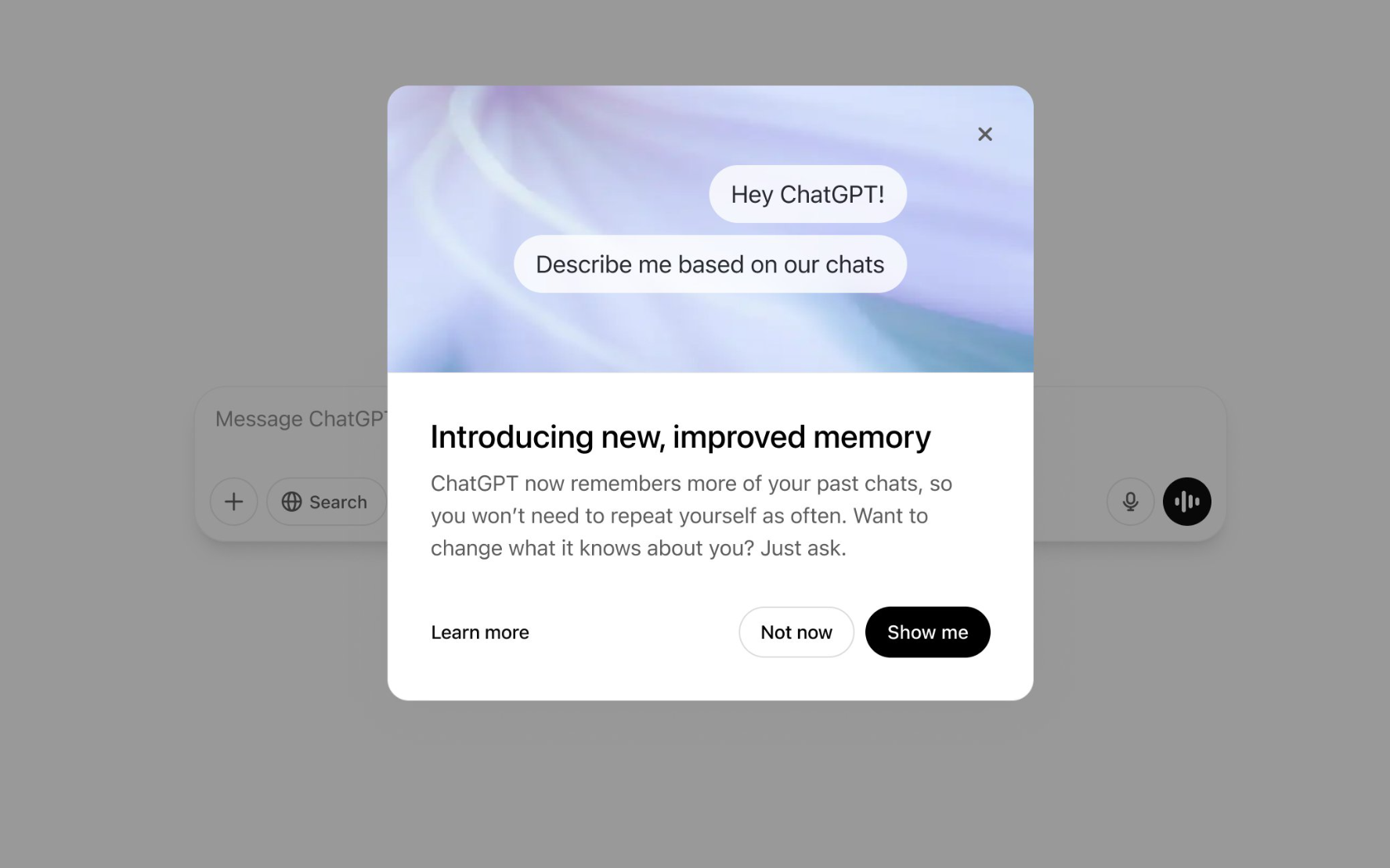OpenAI brings longer-term memory feature to free ChatGPT users

Update as of June 3, 2025:
OpenAI has started rolling out an expanded memory feature for free ChatGPT users. According to OpenAI, this group gets a "lightweight" version of memory designed to provide short-term continuity across conversations. For free users, ChatGPT only recalls information from recent chats. In contrast, the full version available to Plus and Pro subscribers offers what OpenAI calls long-term user understanding (see below).
Outside the European Economic Area (including the UK, Switzerland, Norway, Iceland, and Liechtenstein), the feature is automatically enabled for anyone who has memory turned on. In these regions, users will see a prompt before activating the feature. Settings can be adjusted at any time, and users can bypass memory by switching to Temporary Chat.
Original article from April 10, 2025:
OpenAI has added a new memory capability to ChatGPT that lets the model access and learn from users' complete chat histories. The feature aims to deliver more personalized responses by understanding individual preferences and past conversations.
Until now, ChatGPT's memory was limited to explicitly stored information like names, writing styles, and preferred topics. The update allows the model to incorporate context from previous conversations to generate what OpenAI describes as "noticeably more relevant and useful" responses. New chats will automatically build on earlier interactions, similar to Google's Gemini, which has offered this capability since mid-February.
Video: OpenAI
Users maintain full control over their stored information, with options to view, delete, or modify their chat history. The system offers temporary chat sessions that don't affect memory, and those who previously opted out of memory features are automatically excluded from the new version. Through the settings menu, users can either completely disable the memory function or set specific limitations on how ChatGPT references previous conversations.
Geographic limitations and rollout plans
The feature is currently rolling out to Plus and Pro users, though it excludes countries in the European Economic Area, the UK, Switzerland, Norway, Iceland, and Liechtenstein. Team, Enterprise, and Edu accounts will receive access in the coming weeks. ChatGPT displays a notification at startup to let users know if the memory function is enabled.
This memory enhancement, along with the recent Tasks feature, positions ChatGPT alongside other digital assistants like Google Assistant, Apple's Siri, and Amazon's Alexa. These platforms are moving away from rule-based systems toward more versatile companions powered by generative AI.
OpenAI CEO Sam Altman's vision aligns with this development, as he frequently references the AI assistant from the movie "Her" when discussing the future of powerful AI systems as everyday companions. But this transition has proven challenging. Both Apple and Amazon have faced significant delays in launching their AI-enhanced assistants due to reliability issues and incorrect responses during testing.
"This should feel much more natural, as if you’re talking with a real assistant. [...] I think we’ll look back on memory as a foundational building block of general‑purpose intelligence," writes Nick Turley, who leads the ChatGPT product.
AI News Without the Hype – Curated by Humans
As a THE DECODER subscriber, you get ad-free reading, our weekly AI newsletter, the exclusive "AI Radar" Frontier Report 6× per year, access to comments, and our complete archive.
Subscribe nowAI news without the hype
Curated by humans.
- Over 20 percent launch discount.
- Read without distractions – no Google ads.
- Access to comments and community discussions.
- Weekly AI newsletter.
- 6 times a year: “AI Radar” – deep dives on key AI topics.
- Up to 25 % off on KI Pro online events.
- Access to our full ten-year archive.
- Get the latest AI news from The Decoder.